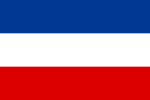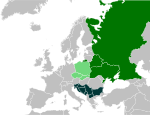يوغسلاڤ
| إجمالي التعداد | |||||||||||||
|---|---|---|---|---|---|---|---|---|---|---|---|---|---|
| ca. 444,000[1][2][3][4][5][6][7] | |||||||||||||
| المناطق ذات التجمعات المعتبرة | |||||||||||||
| 327,131 (2010)[8] | |||||||||||||
| 65,305 (2006)[2] | |||||||||||||
| 26,883 (2011)[3] | |||||||||||||
| 23,303 (2011)[4] | |||||||||||||
| 1,154 (2011)[5] | |||||||||||||
| 527 (2002)[6] | |||||||||||||
| 331 (2011)[7] | |||||||||||||
| اللغات | |||||||||||||
| الصربو-كرواتية، السلوڤينية، المقدونية، البلغارية | |||||||||||||
| الجماعات العرقية ذات الصلة | |||||||||||||
| الشعوب السلاڤية الأخرى، وخصوصاً سلاڤ الجنوب | |||||||||||||
| جزء من سلسلة عن |
| اليوغسلاڤ |
|---|
 |
| حسب المنطقة |
| الثقافة |
| التاريخ |
| اللغات |
| جماعات ذات صلة |
اليوغوسلاڤ (الصربو-كرواتية: Jugoslaveni, Jugosloveni; السيريلية الصربية والمقدونية: Југословени؛ السلوڤينية: Jugoslovani؛ البلغارية: Югославяни؛ إنگليزية: Yugoslavs) هم أقلية تعيش في البوسنة والهرسك وصربيا لا تزال تؤمن أن الصرب والبشناق والكروات والمونتنگرن أمة واحدة وشعب واحد، والكلمة مأخوذه من كلمتين South Slavs وتعني السلافيون الجنوبيون.
التاريخ
قبل الحرب العالمية الأولى
الحرب العالمية الأولى
اعلان كورفو
قبل الحرب العالمية الثانية
Second Yugoslavia and later
| Republics and Provinces | 1961 | 1971 | 1981 |
|---|---|---|---|
| Croatia | .4 | 1.9 | 8.2 |
| Serbia | .2 | 1.4 | 4.8 |
| Bosnia and Herzegovina | 8.4 | 1.2 | 7.9 |
| Kosovo | .5 | .1 | .1 |
| Macedonia | .1 | .2 | .7 |
| Montenegro | .3 | 2.1 | 5.3 |
| Slovenia | .2 | .4 | 1.4 |
| Vojvodina | .2 | 2.4 | 8.2 |
| All of Yugoslavia | 1.7 | 1.3 | 5.4 |
مشاهير اليوغسلاڤ
Yugoslavs have affected world history on many occasions.[10] One prime example is the leader, president for life, and founder of second Yugoslavia, Marshal Josip Broz Tito who organized resistance against Nazi Germany in Yugoslavia,[11][12] he effectively expelled Nazi occupation in Yugoslavia, co-founded the Non-Aligned Movement, and defied Joseph Stalin's Soviet pressure on Yugoslavia.
Other people from Yugoslavia include intellectuals, entertainers, singers and sportspersons, such as:
- Aleksa Đilas[13]
- Ivan Ergić[14]
- Goran Bregović
- Andrej Grubacic
- Lepa Brena[15]
- Ivica Osim[16]
- Božo Koprivica[17]
- Oliver Dulić[18][19]
- Dževad Prekazi[20]
- Magnifico[21][22]
- Milić Vukašinović[23][24]
- Milan Milišić[25]
- Đorđe Ðogani[26]
- Branko Đurić[citation needed]
- Branko Milićević "Kockica"[27]
- Ašok Murti[28]
- Ekrem Jevrić[29]
- Joška Broz,[30] the grandson of Josip Broz Tito
- Boris Vukobrat[31]
- Duško Vujošević
- Josip Pejaković
- Branimir Štulić[32]
- Srđa Popović
- Igor Mandić
- Srđan Dragojević
- Bogdan Tanjević
الهيئات
الرموز
انظر أيضاً
References
- ^ "Selected population profile in the United States - Yugoslavian (176-177)". American Community Survey 2008-2010 3-Year Estimates. United States Census Bureau. Retrieved 2012-04-18.
- ^ أ ب Ethnic Origin (247), Single and Multiple Ethnic Origin Responses (3) and Sex (3) for the Population of Canada
- ^ أ ب Fact sheets : Ancestry – Serbian (last updated 16 August 2012, retrieved 22 December 2012)
- ^ أ ب Population : ethnicity : data by municipalities and cities (PDF). Belgrade: Statistical Office of the Republic of Serbia. 2012. pp. 14, 20. ISBN 978-86-6161-023-3. Retrieved 2012-12-02.
{{cite book}}:|work=ignored (help) - ^ أ ب Census of Population, Households and Dwellings in Montenegro 2011 Monstat – Statistical Office of Montenegro
- ^ أ ب Slovenian census 2002 (in English)
- ^ أ ب Croatian 2011 Census, detailed classification by nationality
- ^ http://factfinder2.census.gov/faces/tableservices/jsf/pages/productview.xhtml?pid=ACS_10_1YR_B04003&prodType=table
- ^ Sekulic, Dusko; Massey, Garth; Hodson, Randy (February 1994). "Who Were the Yugoslavs? Failed Sources of a Common Identity in the Former Yugoslavia". American Sociological Review. American Sociological Association. 59 (1): 85. doi:10.2307/2096134.
- ^ Tito-Stalin Split
- ^ Tito and his People by Howard Fast
- ^ Liberation of Belgrade and Yugoslavia
- ^ Intervju: Aleksa Đilas (in Serbian). Radio Television of Serbia. Nenad Stefanović; 2 December 2009
- ^ "Ich bin ein alter Jugoslawe" (in German). Ballesterer. Fabian Kern; 13 May 2008
- ^ Lepa Brena u Zagrebu?! (in Croatian). Dnevnik.hr. B.G.; 13 December 2008
- ^ Nikad nisam skrivao da sam Jugosloven (in Bosnian). E-Novine. Mario Garber; 19 May 2009
- ^ U fudbalu nema nacionalizma (in Montenegrin). Monitor Online. Nastasja Radović; 16 July 2010
- ^ Слушам савете многих, али одлуке доносим сам (in Serbian). Evropa magazine/Democratic Party web site. Dragana Đevori
- ^ "Dulić: 'Nisam Hrvat nego Jugoslaven'" (in Croatian). Dnevnik.hr. 2007-05-23.
{{cite web}}: CS1 maint: unrecognized language (link) - ^ Kako preživeti slavu (in Serbian). Standard. No. 28; 29 November 2006
- ^ Intervju: Magnifico Il Grande. Po domače, Car (in Slovenian). Mladina. Max Modic; 2007/52
- ^ А1 репортажа – Словенија денес (in Macedonian). A1 Television. Aneta Dodevska; 1 January 2009
- ^ Tifa: Navijam za mog Miću (in Serbian). Blic. M. Radojković; 4 March 2008
- ^ Sve za razvrat i blud (in Serbian). Glas Javnosti. P. Dragosavac; 17 September 1999
- ^ Život za slobodu (in Serbian). E-Novine. Dragoljub Todorović; 4 October 2010
- ^ ЏОЛЕ: Со Слаѓа сум во одлични односи! (in Macedonian). Večer. Aleksandra Timkovska; 5 September 2006
- ^ D. Milićević (12 April 2010). "Uz mališane 33 godine" (in Serbian). Blic. Retrieved 20 July 2011.
{{cite web}}: CS1 maint: unrecognized language (link) - ^ Ostao sam ovde iz inata (in Serbian). Blic. Žiža Antonijević; 23 March 2008
- ^ "Pas do pasa, beton do betona" (in Serbian). Vreme. 2010-07-29.
{{cite web}}: CS1 maint: unrecognized language (link) - ^ DANI – Intervju: Joška Broz, unuk Josipa Broza Tita (in Bosnian). BH Dani. Tamara Nikčević; 14 August 2009
- ^ About Boris Vukobrat Peace and Crises Management Foundation
- ^ Тивка војна меѓу Србија и Хрватска за Џони Штулиќ!? (in Macedonian). Večer . 05-11-2009
- CS1 errors: periodical ignored
- "Related ethnic groups" needing confirmation
- Articles using infobox ethnic group with image parameters
- Articles containing إنگليزية-language text
- Pages using Lang-xx templates
- Pages using div col with unknown parameters
- Articles with unsourced statements from November 2010
- Yugoslav people
- Demographics of Yugoslavia
- South Slavs
- Slavic ethnic groups
- Ethnic groups in the Balkans
- جماعات عرقية في صربيا
- Ethnic groups in Vojvodina
- Ethnic groups in Bosnia and Herzegovina
- Ethnic groups in Slovenia
- جماعات عرقية في الولايات المتحدة
- جماعات عرقية
- جماعات عرقية في أوروپا
- سلاڤ















